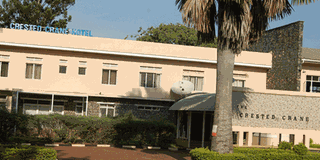Fate of delayed tourism institute

Work on refurbishing the Hotel and Tourism Training Institute in Jinja was supposed to have begun five years ago. The school trains hospitality industry staff. Photo by Edgar. R. Batte.
What you need to know:
- Stalled. Tourism industry players are adversely affected by the delays in refurbishment of the tourism training institute in Jinja.
When the World Bank gave a loan to the Ministry of Tourism in 2013, $12m (Shs4.3b) was set aside for the re-development of Hotel and Tourism Training Institute (HTTI) in Jinja, Eastern Uganda.
This came as good news and a reason for excitement among stakeholders in the hospitality sector because capacity building remains a major challenge in the industry.
But the anticipation is waning. “This is something that we welcomed as an industry because the sector could finally have a point of reference for human resource. We are not only competing among ourselves but at regional level too. We urgently need to have our own school so that we stop importing manpower and taking money out of our economy as most of the hoteliers take their staff to Utalii College,” explains Jean Byamugisha, the executive director of Uganda Hotel Owners Association.
Kenya Utali College (KUC) is one of Africa’s leading hospitality and tourism training institutions. Tanzania has the National College of Tourism and Rwanda has the French international Tourism Institute called Vatel.
Reasons for the delay
According to Doreen Katusiime, the permanent secretary at the Ministry of Tourism, the delays were a result of poor preparation. “We took on the project before doing the preliminary requirement which affected the general processes. For example, after the project had been approved, we had to do a feasibility study, applications to the Jinja Municipal Council, doing the preliminary designs, hiring consultants and all this takes a lot of time,” she says.
She adds that the designs have been approved by top management of the ministry, World Bank, Jinja Municipal Council and are only waiting for Nema (National Environment Management Authority) to do the environmental impact assessment.
HTTI board member, Andrew Atim says these are some of the gaps they anticipate to fill when the institute restructures, with funding from World Bank.
And as for running behind schedule, the value of the WB funding has reduced due to issues of the dollar rate fluctuating. Byamugisha is irked by this, adding that it is unfortunate that close to $5m (Shs1.8bn) of the $12m (Shs4.3bn) has been lost.
“I am sure World Bank must be disappointed at the lack of implementation of this project. We, as industry players, are extremely disappointed. This is something we knew was urgent and needed to kick off immediately,” she explains.
“We have lost quite a bit of money. We are in discussions with the WB,” she says.
What the money will do
The money meant to upgrade HTTI will go towards building infrastructure and putting up a proper training hotel, but to also review the curriculum so that it can be in tune with international standards and be skills-driven.
This settles qualms by stakeholders in the tourism sector. Tour operator Francis Mugoga, says the quality of graduates from the institute is still wanting because they are not competent enough to be accommodated in the hospitality industry.
“We have trained two staff; former students of the institute and my observation is that the material taught there is not relevant to the current needs and demands of the hospitality industry,” Mugoga who also runs Tourism Institute of East Africa, states.
Katusiime cannot agree more. “Hospitality is practical and we need a hotel where students can have hands-on training so we are going to have restaurants and kitchens and generally equip. I am sure you have noticed that in most of the top hotels, the managers are not Ugandans. Kenya has invested in their Utali College. We have a serious skills gap in the hospitality sector.”
Changes to be made
Due to lost money though, there are adjustments to the master plan. The rooms at the hotel will be reduced from 80 to 50 and a sports ground will be foregone. When re-developed, the institute will have capacity to take in about 700 students.
Byamugisha says they are, so far, disappointed because almost five years down the road, there is not much that has been done to redevelop and rebrand the institute.
Richard Kawere, a certified East African hotel and restaurant standards’ assessor, says the institute urgently needs an infrastructure upgrade.
According to HTTI’s board member, Andrew Atim, the institute is in the final stages of the preparation for the re-brand. “Actually the designs for the new facility are in place and most of the approvals have been done. CEDP has been instrumental in getting this done together with the Ministry of tourism,” he adds.
CEDP is Competitiveness and Enterprise Development Project. It is a World Bank funded project.
According to Atim, when this re-brand is complete, the institute will be operating by international standards.
Government is also looking at the curriculum. Katusiime says the ministry has already identified an international firm that is helping with drafting of a new curriculum in consultation with the National Council of Higher Education. Textbooks are also being procured.
The tourism permanent secretary says inauguration of a new board is a milestone. “The institution did not have a board and with one in place, it will run as an independent body as opposed to being run as a department under the ministry as has been the case. They will now have their own budget. It will also change name from HTTI to Uganda Hotel Tourism Training Institute,” she adds. Development of competent human resource is the most sought after goal that is seen as key in raising the level of Uganda in the tourism industry.


